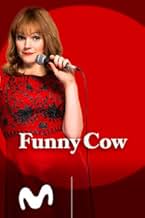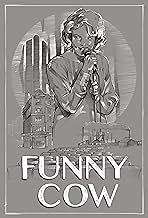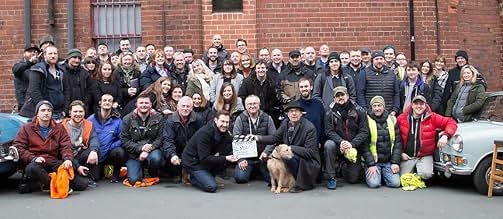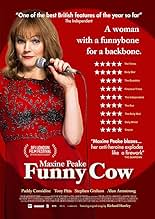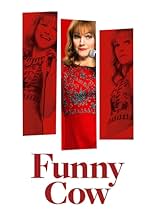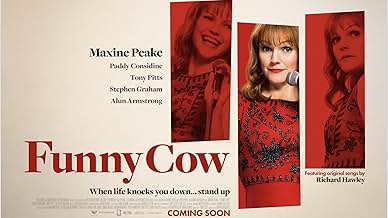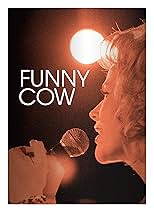Funny Cow
- 2017
- 1h 42m
IMDb RATING
6.5/10
2.6K
YOUR RATING
A comedian uses her troubled past as material for her stand-up routine, trying to rise up through the comedy circuit by playing Northern England's working men's clubs.A comedian uses her troubled past as material for her stand-up routine, trying to rise up through the comedy circuit by playing Northern England's working men's clubs.A comedian uses her troubled past as material for her stand-up routine, trying to rise up through the comedy circuit by playing Northern England's working men's clubs.
- Awards
- 3 nominations total
- Director
- Writer
- All cast & crew
- Production, box office & more at IMDbPro
Featured reviews
"It's always been too much for me... life... and not enough. All at the same time..."
Funny Cow is the tale of fictional female comic, Funny Cow (FC). It's a piece whose narrative is loosely anchored around occasional footage of FC delivering some sort of 'For TV' career retrospective monologue in which she reflects upon her life and times to date. Going by this particular TV performance's high production values, it would seem that this is at a point in her life when she's clearly 'made it'. Whatever that may really mean.
There's a pervading air of melancholy about it all, something that is very much prevalent in this Adrian Shergold film which traces FC's life from its poverty-stricken beginnings, through the frustrations of an abusive marriage, to her eventual breakthrough success (and beyond) as a female comedian.
The child of an alcoholic mother and abusive father, comedy had always been the perfect outlet for FC, but it's only ultimately through a combination of perseverance and a bitter-sweet twist of fate that she finally gets a chance to prove her worth.
Though the backstory of Shergold's film is to some extent one of developing the courage to shoot for the stars, Funny Cow is just as concerned with the concept of female empowerment, and examining life's myriad struggles and the ties that so often bind us, whether we would choose them to or not.
"Confucius say: He who drop watch down toilet have shitty time..."
The 1970's northern working class setting and brash sense of old fashioned humour lends Funny Cow something of a gritty backdrop, and whether it be racial stereotypes or 'in-bad-taste' one-liners, considering that we live today in such a timid and easily-offended nanny state, it's actually rather surprising - and refreshing - that so much of a nationally-released film's shall we say, 'questionable' language and terminology has not been airbrushed from history. Undoubtedly this lends the piece a real sense of authenticity which could so easily have been stripped away, much to the film's detriment.
That said, though the more controversial content is at most fleeting, truth be told, this is probably not one for the easily offended or keen advocates of a more modern Sofie Hagen-esque safe-space type of comedy. But that probably goes without saying.
Paddy Considine's awkwardly circumspect portrayal of Angus, the arts-loving, book shop owner and FC's woefully mismatched other half for a period of time, is reassuringly solid and understated. Lindsey Coulson's performance as FC's mother in later life, though not an extended role, is nonetheless arresting for its depth, range and conviction, whilst Alun Armstrong's turn as the tragic, long-in-the-tooth jobbing morose comic, Lenny, is a highly impressive if excruciatingly mournful performance.
And then of course there's Maxine Peake whose performance as FC wonderfully encapsulates the actions and emotions of a woman who is first to acknowledge that she has never really fitted in, and whose struggles and persistence - not to mention a thicker than average skin - have eventually paid off professionally-speaking.
Although there is evidently a part of her that remains unfulfilled and more than a little world-weary, the over-riding impression here is that FC is one life's great survivors, who, having been through so much in her life is consequently an emboldened woman, steadfastly refusing to ever even entertain the notion of being considered a victim.
Aided by Richard Hawley's sympathetic soundtrack, Adrian Shergold expertly straddles the line between good and bad taste, between tragedy and triumph, and between tears and substantial laughter, to produce not only a film that is genuinely funny, but one which is thoughtful and emotionally engaging too.
This and hundreds of other films are reviewed on my WaywardWolfBlog
Funny Cow is the tale of fictional female comic, Funny Cow (FC). It's a piece whose narrative is loosely anchored around occasional footage of FC delivering some sort of 'For TV' career retrospective monologue in which she reflects upon her life and times to date. Going by this particular TV performance's high production values, it would seem that this is at a point in her life when she's clearly 'made it'. Whatever that may really mean.
There's a pervading air of melancholy about it all, something that is very much prevalent in this Adrian Shergold film which traces FC's life from its poverty-stricken beginnings, through the frustrations of an abusive marriage, to her eventual breakthrough success (and beyond) as a female comedian.
The child of an alcoholic mother and abusive father, comedy had always been the perfect outlet for FC, but it's only ultimately through a combination of perseverance and a bitter-sweet twist of fate that she finally gets a chance to prove her worth.
Though the backstory of Shergold's film is to some extent one of developing the courage to shoot for the stars, Funny Cow is just as concerned with the concept of female empowerment, and examining life's myriad struggles and the ties that so often bind us, whether we would choose them to or not.
"Confucius say: He who drop watch down toilet have shitty time..."
The 1970's northern working class setting and brash sense of old fashioned humour lends Funny Cow something of a gritty backdrop, and whether it be racial stereotypes or 'in-bad-taste' one-liners, considering that we live today in such a timid and easily-offended nanny state, it's actually rather surprising - and refreshing - that so much of a nationally-released film's shall we say, 'questionable' language and terminology has not been airbrushed from history. Undoubtedly this lends the piece a real sense of authenticity which could so easily have been stripped away, much to the film's detriment.
That said, though the more controversial content is at most fleeting, truth be told, this is probably not one for the easily offended or keen advocates of a more modern Sofie Hagen-esque safe-space type of comedy. But that probably goes without saying.
Paddy Considine's awkwardly circumspect portrayal of Angus, the arts-loving, book shop owner and FC's woefully mismatched other half for a period of time, is reassuringly solid and understated. Lindsey Coulson's performance as FC's mother in later life, though not an extended role, is nonetheless arresting for its depth, range and conviction, whilst Alun Armstrong's turn as the tragic, long-in-the-tooth jobbing morose comic, Lenny, is a highly impressive if excruciatingly mournful performance.
And then of course there's Maxine Peake whose performance as FC wonderfully encapsulates the actions and emotions of a woman who is first to acknowledge that she has never really fitted in, and whose struggles and persistence - not to mention a thicker than average skin - have eventually paid off professionally-speaking.
Although there is evidently a part of her that remains unfulfilled and more than a little world-weary, the over-riding impression here is that FC is one life's great survivors, who, having been through so much in her life is consequently an emboldened woman, steadfastly refusing to ever even entertain the notion of being considered a victim.
Aided by Richard Hawley's sympathetic soundtrack, Adrian Shergold expertly straddles the line between good and bad taste, between tragedy and triumph, and between tears and substantial laughter, to produce not only a film that is genuinely funny, but one which is thoughtful and emotionally engaging too.
This and hundreds of other films are reviewed on my WaywardWolfBlog
Funny Cow is one of those British gems. Brutal, bleak, tender and comic. Only we can do this.
Set in the 1970's working men's clubs. It's a world of sweat, smoke; racism and sexism. We also have flashbacks to a 1950's childhood of poverty and domestic violence. Funny Calf (love that) is full of energy, mischief and defiance..
Men do not fare well in this film. Either beer-stained and openly violent, or sophisticated, affluent and weak Considine.
My favourite moment are the auditions for a "Search For A Star." Great cameos from John Bishop and Vic Reeves. The film's climax where she swears and tells racist, homophobic jokes is shocking. But it shouldn't be diluted, and the audience is delighted to hear her just as coarse and aggressive as any male comedian of the period.
Not everything works.The storyline is choppy and episodic, leaping randomly back and forth in time. It's disconcerting to see Stephen Graham as nasty father one moment, net curtain-twitching brother the next. Even Funny Cow seems remote at times, but it's great stuff from Peake.
Set in the 1970's working men's clubs. It's a world of sweat, smoke; racism and sexism. We also have flashbacks to a 1950's childhood of poverty and domestic violence. Funny Calf (love that) is full of energy, mischief and defiance..
Men do not fare well in this film. Either beer-stained and openly violent, or sophisticated, affluent and weak Considine.
My favourite moment are the auditions for a "Search For A Star." Great cameos from John Bishop and Vic Reeves. The film's climax where she swears and tells racist, homophobic jokes is shocking. But it shouldn't be diluted, and the audience is delighted to hear her just as coarse and aggressive as any male comedian of the period.
Not everything works.The storyline is choppy and episodic, leaping randomly back and forth in time. It's disconcerting to see Stephen Graham as nasty father one moment, net curtain-twitching brother the next. Even Funny Cow seems remote at times, but it's great stuff from Peake.
A Gritty grim film about the school of hard knocks which leads to the eventual success (obviously) of funny cow. Some lovely cameos from various faces from British tv. Kevin Rowland to name but one. Music by Richard Hawley, he also is seen taking part in s talent show and later singing on stage in s working man's club with "coffee" played by Corine Bailey Rae.
It's a great film Maxine Peake is immense, likewise Alun Armstrong is wonderful as the bitter ageing comedian I'm not sure if this was originally a stage play, it does have that feel but don't let that put you off.
It's about a comic but it's not a comedy
It's a great film Maxine Peake is immense, likewise Alun Armstrong is wonderful as the bitter ageing comedian I'm not sure if this was originally a stage play, it does have that feel but don't let that put you off.
It's about a comic but it's not a comedy
Maxine Peake is on top form as a conflicted maverick in seventies Yorkshire who rails against the endless stream of male violence ,human indifference and suffering with her dry wit. The film tips a huge nod to kitchen sink dramas like Saturday night Sunday morning and there's no flinching away from the racist /sexist/homophobic jokes of the era. This film is not for everyone but does provide lots of humorous lines and moments amid the relentless misery. Cameos agogo - even Corrine Bailey Rae gets a look in !
Many people who have commented on this movie seem to have been somewhat misled by the title. Perhaps they were expecting Monty Python irreverence, a ventriloquist with a bovine puppet, or at the very least a new Wallace & Gromit adventure.
It may not be funny in the realms of a deep belly laugh, but if you like your humour blacker than coal then there are enough things in here to make you chuckle at least. The soundtrack by Richard Hawley is excellent and helps set the dark tone of the whole movie.
The movie has two central themes: the struggle of women in the 70's to be seen more than just a housewife, or an object owned by a man, "woman aren't funny", "where's my dinner" that sort of nonsense; The other theme is where does humour come from? What drives the people who make us laugh?
The theme of being more than a housewife treads familiar territory. Abusive father, abusive husband, sexist attitudes by the men in charge, woman struggles to prove how good she is. Whilst historically accurate, it is the least interesting part of the movie. In 2018 we know the struggle for equality has largely been successful and although there is still a way to go, if you are funny you will get a gig if you are black, white, Chinese, a woman, or indeed a combination of any of those. There is a great scene in a club where Funny Cow is doing her second gig. The crowd, not used to seeing a woman on stage is hostile. A heckler steals a few punchlines, admittedly from tired old gags, and Funny Cow after briefly being taken aback, just dismantles him gag by gag. Within 30 seconds the crowd are eating out of her hand. Funny is truly equal opportunity and has no sex, race or creed.
When the film starts to look at where the humour comes from, it becomes much more interesting and dramatic. This theme is played out by the heroine, Funny Cow and a tired, down trodden old comic that Funny Cow is trying to learn the trade from. Both Alun Armstrong and Maxine Peak are brilliant in these roles, getting inside the dark, tortured place that seems to be inhabited by many stand up comedians and showing what a heavy price is paid for their gift of making people laugh.
Armstrong is just simply superb as he flounders on stage, resorting to racist jokes as he seeks out the laughs he craves like a drug. The sheer desperation in his eyes, in complete contrast to the smile on his lips and the humorous words he is dishing out to the audience. Painful to watch, but somehow compelling drama.
Funny Cow is made of much tougher stuff and wears her humour like kevlar armour to deflect the pain of the beatings, abuse and the sheer bloody boredom of being a housewife. Peake portrays her tough, whip smart persona with just the right amount of vulnerability to show her human side and reveal the damage done to her by her tough upbringing.
No, Funny Cow isn't a comedy, or a stand up show, but nevertheless it is a compelling drama with a few chuckles, a brilliant soundtrack and some first rate acting.
It may not be funny in the realms of a deep belly laugh, but if you like your humour blacker than coal then there are enough things in here to make you chuckle at least. The soundtrack by Richard Hawley is excellent and helps set the dark tone of the whole movie.
The movie has two central themes: the struggle of women in the 70's to be seen more than just a housewife, or an object owned by a man, "woman aren't funny", "where's my dinner" that sort of nonsense; The other theme is where does humour come from? What drives the people who make us laugh?
The theme of being more than a housewife treads familiar territory. Abusive father, abusive husband, sexist attitudes by the men in charge, woman struggles to prove how good she is. Whilst historically accurate, it is the least interesting part of the movie. In 2018 we know the struggle for equality has largely been successful and although there is still a way to go, if you are funny you will get a gig if you are black, white, Chinese, a woman, or indeed a combination of any of those. There is a great scene in a club where Funny Cow is doing her second gig. The crowd, not used to seeing a woman on stage is hostile. A heckler steals a few punchlines, admittedly from tired old gags, and Funny Cow after briefly being taken aback, just dismantles him gag by gag. Within 30 seconds the crowd are eating out of her hand. Funny is truly equal opportunity and has no sex, race or creed.
When the film starts to look at where the humour comes from, it becomes much more interesting and dramatic. This theme is played out by the heroine, Funny Cow and a tired, down trodden old comic that Funny Cow is trying to learn the trade from. Both Alun Armstrong and Maxine Peak are brilliant in these roles, getting inside the dark, tortured place that seems to be inhabited by many stand up comedians and showing what a heavy price is paid for their gift of making people laugh.
Armstrong is just simply superb as he flounders on stage, resorting to racist jokes as he seeks out the laughs he craves like a drug. The sheer desperation in his eyes, in complete contrast to the smile on his lips and the humorous words he is dishing out to the audience. Painful to watch, but somehow compelling drama.
Funny Cow is made of much tougher stuff and wears her humour like kevlar armour to deflect the pain of the beatings, abuse and the sheer bloody boredom of being a housewife. Peake portrays her tough, whip smart persona with just the right amount of vulnerability to show her human side and reveal the damage done to her by her tough upbringing.
No, Funny Cow isn't a comedy, or a stand up show, but nevertheless it is a compelling drama with a few chuckles, a brilliant soundtrack and some first rate acting.
Did you know
- TriviaLoosely based on the life and career of British comedienne Marti Caine.
- GoofsPaddy Considine's character says "the whole nine yards" which is an Americanism barely used in England today, and unheard of in the 1970s.
- Crazy creditsVic Reeves (Jim Moir), who plays a cabaret performer in the film, nods to his recording of 'Born Free' in 1991 with 'Vic Reeves and The Roman Numerals' which reached number 6 in the UK singles chart
- ConnectionsFeatured in Granada Reports: 11 May 2018: Evening Bulletin (2018)
- How long is Funny Cow?Powered by Alexa
Details
- Release date
- Country of origin
- Official sites
- Language
- Also known as
- Смешная корова
- Filming locations
- Production companies
- See more company credits at IMDbPro
Box office
- Gross worldwide
- $739,252
- Runtime1 hour 42 minutes
- Color
Contribute to this page
Suggest an edit or add missing content



